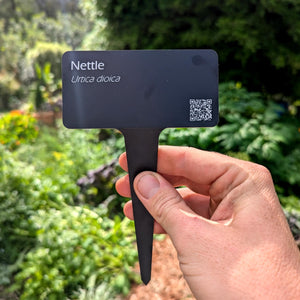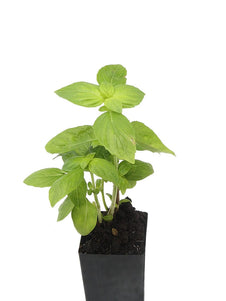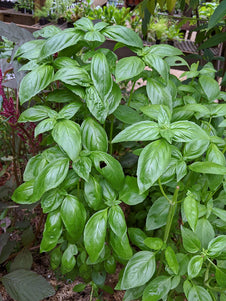





Sweet Basil
Sweet Basil

- Low stock - 5 items left
- Inventory on the way

Usually available: August to March
Life cycle: Annual
Height: 1m
Position: Full sun
Soil preference: Well drained
This is how we pack and send your Herb Plants to all states except TAS & WA
You will receive
- 1 Sweet Basil Herb Plant in a 50 X 75mm tube - General growing instructions
All of our Herb Plants are grown organically with certified organic potting mixes and fertilizers
Botanical Name: Ocimum basilicum
Sweet Basil is a commonly known annual herb with a sweet, pungent aroma. The different varieties vary in height, from 30-80cm tall and take on a bushy appearance. The roots are thin and branching, with the stems growing out of the roots and bearing many leaves. Flowers are often white, but may range to pink, red and lavender, and are held above the leaves on stalks of varying length. The seeds are extremely small and dark brown in colour. Leaf shape and colour is variable according to the variety of basil. There may be light to deep greens, purples and even yellows combined with smooth, rough, crinkled or ruffled leaves.
Basil is native to India, but it now grows everywhere with many cultivars being developed, including some perennials. There are over 150 varieties, each with a distinctive flavour, aroma, colour, shape and its own essential oil composition. This allows each to be used for different purposes.
Basil has been in cultivation for over 5000 years in India. However, the word Basil comes from the Greek for ‘king’ due to its association with the Feast of the Cross’.
Growing Conditions
The flavour and intensity of basil is affected by the growing environment, so it is important to pay attention to the soil, sun, and water or rainfall conditions. Each variety has similar requirements but may have some specific tolerances or minor difference in requirements.
Generally, basil prefers warm to hot climates of around 25-30 degrees C, reflecting its origins. The leaves and roots are very cold and frost-sensitive, so it is best to grow the plants indoors or with good protection during cold winters. Most varieties do well in pots, especially some of the more compact cultivars.
Like many herbs, basil prefers full sun but can tolerate part shade. Some varieties prefer or tolerate a little more shade than others. Basil is quite delicate and does need wind protection and shade in tropical areas. In the tropics and in cold conditions, even perennial varieties may be treated as an annual. Plants can be trimmed to shape or the shape and growth can be maintained by pinching out the flowers.
Basil is generally tolerant of a wide range of soils, but ideally, you should provide rich, moist, well-drained soil. Although basil may have originated in a tropical region, periods of high humidity and high rainfall can lead to problems like leaf spot disease.
Basil seeds can be planted directly into the garden, or sown in seed trays, during spring and autumn in warmer areas. They are usually quick to germinate and can then be thinned or planted out.
You can harvest basil at any time, but sweet leaves are often the best. If you would like the seeds, which are also useful, wait until after flowering but just before the seeds are released. Leaves and sprigs can be preserved in oil and/or vinegar, or dried and kept in airtight containers.
Culinary Uses
Almost everyone knows basil is great for cooking and it is a herb that you can add to most dishes without fear. It may be used fresh, frozen or dried and also added to vinegar and olive oils. Leaves and sprigs may be preserved in oils and vinegars for later use.
The many varieties of basil offer an extensive array of different flavours, such as lemon, lime or anise. Try basil in fish dishes, in omelettes, salads, vegetables, sauces, pesto and in stuffing. It is better to tear leaves rather than cut them, to preserve the integrity of the oils in the leaves.
Basil plays a major role in South East Asian cuisine including use by countries like Thailand, Indonesia and Vietnam. It is also very popular in Italian cooking and many varieties of Basil have been developed in Italy. In Italian cooking, basil is often paired with tomatoes to very good effect.
Chinese cooking includes using basil in soups, while the Taiwanese steep basil in ice cream or milk and chocolate to create an interesting flavour. The flower buds are also edible and have a subtle flavour.
Medicinal Uses
Naturally, most people use basil for culinary purposes or as garden plants. However, basil is said to be a good remedy for travel sickness, a very useful mouth gargle and of assistance for a number of other ailments. These include stomach spasms, loss of appetite, indigestion, kidney conditions, fluid retention, head colds and warts. It is thought some of the many chemicals in basil might assist in fighting intestinal worms.
As a topical agent, basil can be used for skin ointment and for its anti-bacterial properties. Used in tea, basil is said to ward off headaches, depression and tiredness. It also has value as an eyewash.
Basil contains vitamin C, calcium and several minerals. It is useful for lowering blood sugar in some people but is not reliable in this respect. Basil also contains estragole, which can contribute to liver cancer in high amounts.
Other Uses
Basil leaves are said to be insect repellent, so it might be wise to plant some wherever you sit outdoors.
Companion Planting
Basil and tomatoes are said to be good companions. Basil is also known to be a good insect repellent.
All information provided on this website is for informational purposes only. Please seek professional advice before commencing any treatment.






